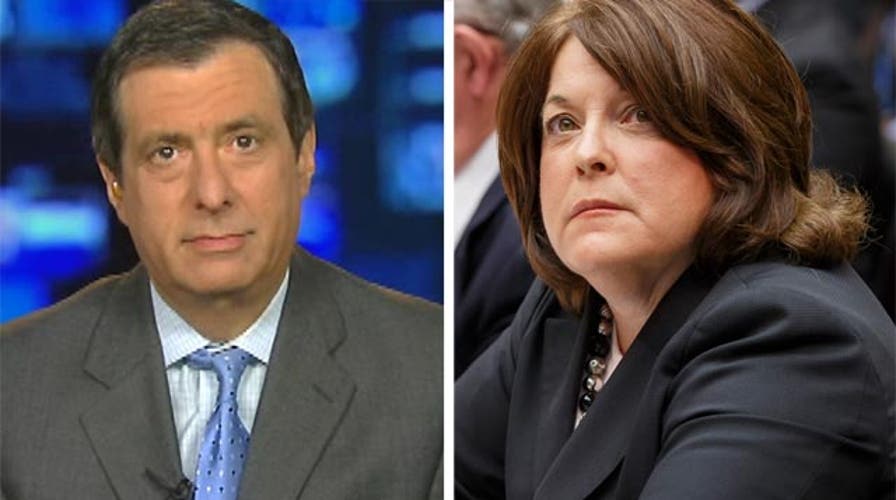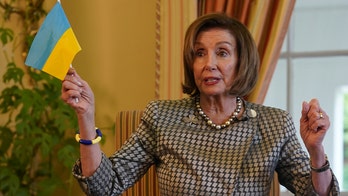Kurtz: Media helped oust Secret Service director
'Media Buzz' host reacts to Julia Pierson's resignation
The media chorus--Julia must go!—was loud, and by this afternoon it had reached such a high decibel level that Julia Pierson had little choice but to resign.
Pierson was already in deep trouble. The series of appalling security breaches in protecting the First Family, and her defensive and unemotional performance before a House committee, didn’t help her case.
When your employees allow an armed felon on the elevator with the president, fail to subdue a White House fence jumper until he reaches the East Room, and botch the probe of a hail of bullets that pierced the mansion, your job security is obviously not the best.
But what unfolded next was a familiar Washington ritual. When an agency’s failures and flaws are exposed, the media start speculating about whether its leader can survive. That turns into the endless questioning of whether the person can hang onto the job, which then morphs into demands that the embattled figure get the boot.
The sound grows so deafening that agency chief is essentially forced out, simply to allow the administration to change the subject.
Thus, you had White House spokesman Josh Earnest expressing full confidence in Pierson in the morning, and explaining in the afternoon why President Obama had called her to thank her for her service.
A reporter asked: What changed?
It was that Pierson offered her resignation, Earnest said—as if these things happen in a vacuum.
The repeated revelations in the Washington Post also fueled the uproar, news cycle by news cycle.
Pierson told Bloomberg News it was “painful to leave” but that “we were at the point where it was going to be hard for the department and president to have confidence in the Secret Service leadership if I didn’t step down.” On that point, she is correct. And she added a swipe at the Fourth Estate, saying: "The media has made it clear that this is what they expected.” Which, I have to say, is true.
Of course, the act of resignation rarely solves the underlying problems. But the media are absorbed with the politics of symbolism, and after the forced ouster, the story usually fades and they move on to some other outrage.
In the television coverage, Pierson’s fate came up again and again.
“Are you telling me the president of the United States and the first lady have confidence in Julia Pierson to run an agency that’s supposed to protect their two daughters?” asked MSNBC’s Joe Scarborough.
“Yes, Joe, they have confidence in them,” Earnest replied, pivoting to talk about the professional agents who protect the president. Scarborough said he wasn’t talking about them but their leadership.
Andrea Mitchell asked John McCain the same question. He said Pierson should go, but that more importantly, Democrats were beginning to say she should go.
In fact, Elijah Cummings, ranking Democrat on the House oversight panel, told radio host Roland Martin: “I think this lady has to go. There has to be drastic changes.” The Maryland congressman later clarified that he wasn’t “officially” calling for her resignation, but that’s not much of a distinction.
Pierson’s gender has also become an issue. Fox’s Andrea Tantaros said: “Remember, when [Obama] appointed this director, he was under fire for not having enough women in the administration. So: can’t let a crisis go to waste, gotta score political points. So what did he do? He appointed a woman. Who probably, looking at her background, wasn’t the best person for the job. She didn’t have the experience.”
Leaving aside that Pierson is a former agent who had been chief of staff, I doubt many voters knew who she was until last week. But it’s fair to say—and this came up on “Morning Joe”—that she got the promotion in part because the Secret Service had just been through a humiliating prostitution scandal and needed to change its frat-boy image.
In the Obama administration, the media default setting of demanding that heads roll has run smack into the president’s reluctance to fire people. No matter how loud the drumbeat over the botched ObamaCare rollout, he would not dump Kathleen Sebelius…she didn’t resign until months later. Obama defended Eric Shinseki during the VA scandal, but the secretary was finally nudged out the door.
The Secret Service fiasco feels different, and not just because the president has a very personal stake in the agency that protects his family. It’s because this was a gut punch to everyone who can’t understand why the North Portico door was left unlocked and why the alarm was disabled. What’s more, Pierson’s agency put out misleading and incomplete accounts and still hasn’t explained why.
Julia Pierson’s resignation was inevitable. The administration was smart not to drag the drama out for days or weeks. Whether the press stays on the problems that endangered the president’s life is another question.





